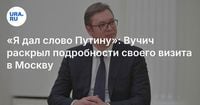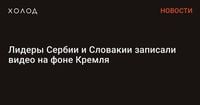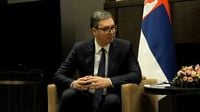Serbian President Aleksandar Vucic recently showcased his commitment to strengthening ties with Russia by attending the 80th anniversary of Victory Day celebrations in Moscow. Vucic, who shared a video on his Facebook page featuring him alongside Slovak Prime Minister Robert Fico against the backdrop of the Kremlin, emphasized the brotherhood between Serbs and Slovaks. He captioned the video, "A fraternal meeting with Slovak Prime Minister Robert Fico this evening in Moscow. Serbs and Slovaks are brotherly nations!"
The journey to Moscow was not without its challenges. According to the Telegram channel Ostorozhno, Novosti, both Vucic and Fico faced significant obstacles when flying to Russia. Estonia and Latvia denied permission for Vucic's plane to traverse their airspace, forcing a detour through Hungary, Romania, and Georgia. Fico remarked, "Of course, this is a conscious attempt to disrupt my visit to Moscow for the official commemoration of the 80th anniversary of the end of World War II." This sentiment was echoed by Vucic, who noted that his plane was also forced to make a stop in Baku due to Moscow's airspace closure following drone attacks.
In an interview with Russia 1, Vucic reaffirmed his promise to Russian President Vladimir Putin, stating, "I gave my word to President Putin that I would be here today, and I fulfilled what I said. But I think that an organized conversation with the President of Russia about the development of our bilateral relations is very important for us." He underscored the significance of preserving the memory of the Great Patriotic War, expressing pride in the Serbian people's role in this victory.
Vucic's visit to Moscow comes amid warnings from the European Union to its member states and candidate countries against attending the May 9 celebrations. In response, Vucic clarified that he promised Putin he would attend Victory Day but would do so without government and military representatives to avoid sanctions. He stated, "We have a big task to preserve the memory of the great victory. I am proud of the role of the Serbian people in this victory."
Alexei Pushkov, chair of the Federation Council's information policy committee, praised Vucic's decision to attend the event, calling it a display of political courage. He noted that Vucic did not succumb to threats from Brussels, stating, "Vucic is applauded by Serbia and Russia, as well as everyone in Europe who considers the victory over German Nazism a supreme and genuine European value." Pushkov contrasted this with many current European politicians, whose ancestors served in the Wehrmacht or were members of Hitler's party, suggesting they have little to be proud of.
Moreover, Maria Zakharova, the official representative of the Russian Foreign Ministry, criticized the European Commission's actions regarding Vucic's visit, comparing them to tactics used by mafia and criminal groups. She questioned the democratic principles of European countries, asserting that the European Commission is resorting to methods it itself rejects—dictatorship.
Vucic's arrival in Moscow on May 7 was delayed due to military operations between Russia and Ukraine, which have intensified since May 6, with Ukrainian drones targeting airports in central Russia. This prompted Rosaviatsia to impose temporary restrictions on the operation of air harbors. Vucic expressed gratitude for the warm reception and hospitality he received in Moscow, showcasing the importance of this visit for both Serbia and Russia.
As over 20 countries, including Brazil, Venezuela, Armenia, and China, participated in this year’s Victory Day parade, Vucic's presence highlighted Serbia's ongoing commitment to its historical ties with Russia. The event not only commemorated the end of World War II but also served as a platform for reinforcing diplomatic relations in a time of geopolitical tension.
In summary, Vucic's participation in the 80th anniversary of Victory Day reflects a significant moment in Serbia's foreign relations, particularly with Russia. As geopolitical dynamics shift and tensions rise, Serbia's approach under Vucic's leadership may set the stage for future alliances and diplomatic strategies. The president's commitment to honoring history while navigating contemporary challenges underscores the complexity of international relations in today's world.






